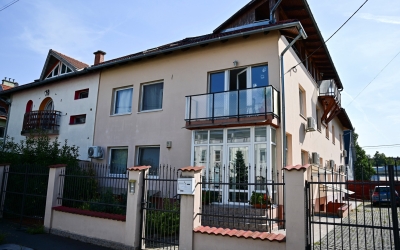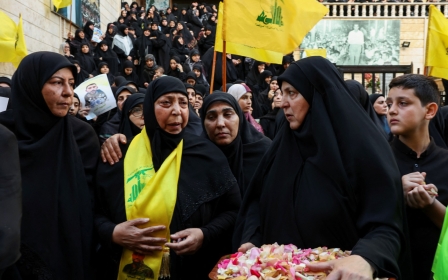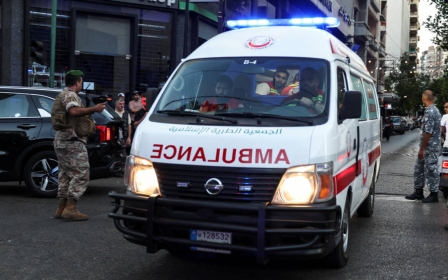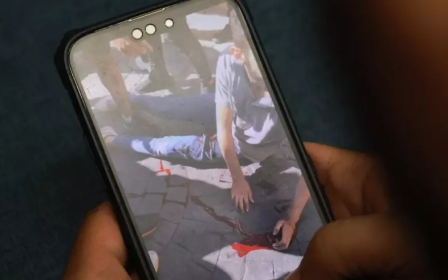Lebanon: Hezbollah 'suspects internal breach' led to pager attacks, launches probe
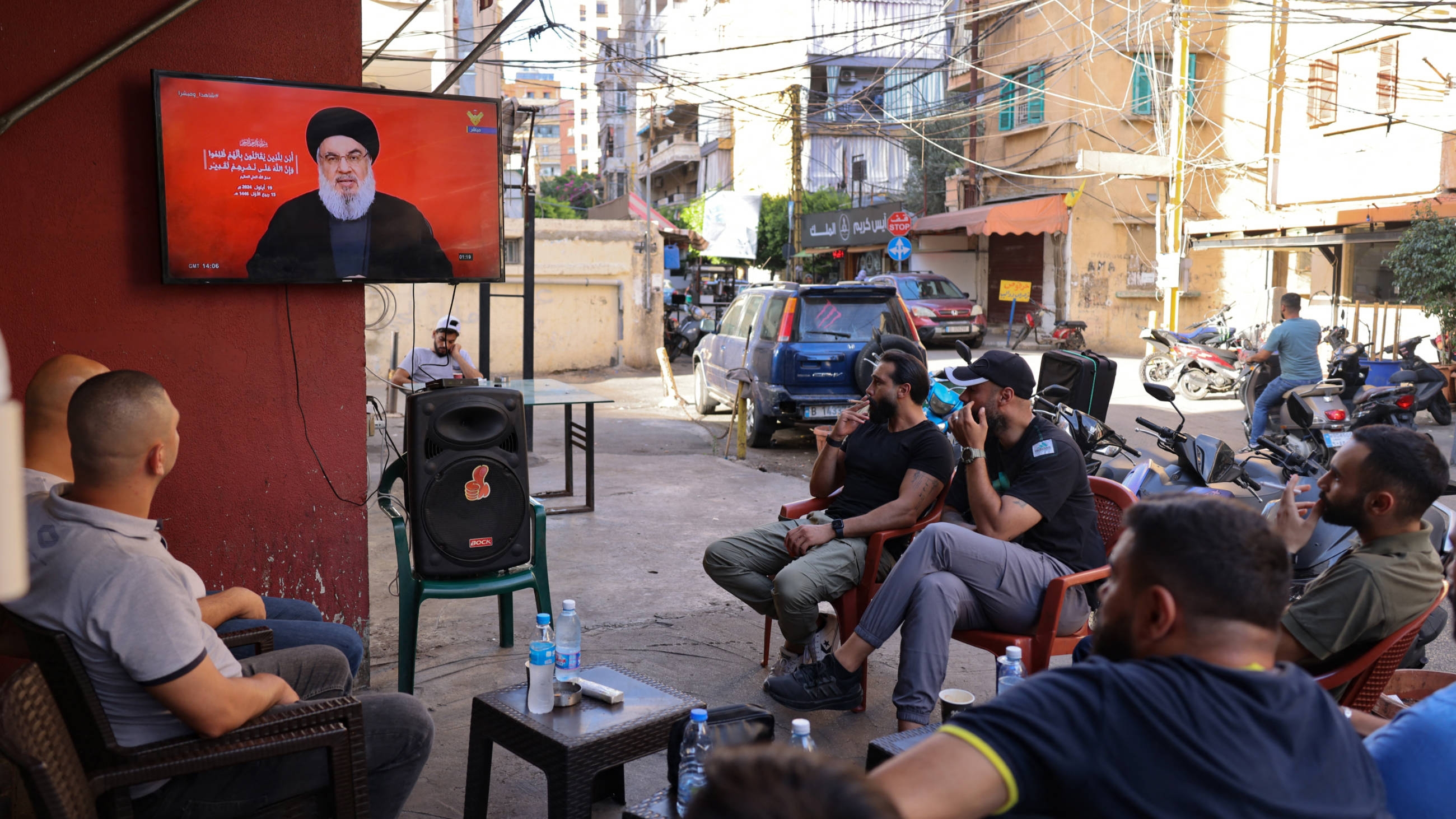
Hezbollah chief Hassan Nasrallah on Thursday said the group has launched an internal probe into the explosion of thousands of communication devices used by its operatives across Lebanon.
Nasrallah acknowledged that his group had suffered a severe blow in the Israeli attacks, adding that Israel "crossed all red lines".
Over two days, coordinated blasts hit thousands of Hezbollah’s pagers and walkie-talkies across Lebanon, killing 37 people, including two children, and wounding around 3,000 others.
"There is no doubt that we have been subjected to a major security and military blow that is unprecedented in the history of the resistance and unprecedented in the history of Lebanon," Nasrallah said in a television address.
A source familiar with the investigation told Middle East Eye that the probe was launched at the highest levels and the group suspects a security breach aided by infiltrators.
New MEE newsletter: Jerusalem Dispatch
Sign up to get the latest insights and analysis on Israel-Palestine, alongside Turkey Unpacked and other MEE newsletters
Thousands of pagers and walkie-talkies ordered by Hezbollah were rigged before entering Lebanon, fitted with explosive material weighing no more than one to two ounces and a switch that could be triggered remotely.
The source said the group is examining its failure to detect the explosive material, despite the standard tests conducted by its security apparatus upon receiving the shipment.
He added that this failure reveals "negligence" on Hezbollah’s part, but also more urgently indicates that Mossad, Israel’s spy agency, possessed internal information about the technology the group would use when examining its equipment.
“The Mossad likely had intelligence that enabled it to circumvent Hezbollah’s security checks, as the explosives planted in the device had gone undetected during the tests the group had performed,” the source said.
Though Israel has neither confirmed nor denied orchestrating the attacks, defence and intelligence officials who spoke to The New York Times on the condition of anonymity said the Israelis were behind the attacks.
Mossad agents
Hezbollah has internally acknowledged the existence of a crack in its closed network, the source said, and is now investigating the extent of this security breach.
“This means the presence of high-level agents that the Mossad was able to recruit to breach the group’s internal network,” the source said.
'The Mossad likely had intelligence that enabled it to circumvent Hezbollah’s security checks'
- Source familiar with Hezbollah's investigation
“Hezbollah suspects that the level of infiltration within its ranks, including in its closed circle of leadership, is likely significant, otherwise this attack wouldn’t have taken place,” the source said.
Military analyst Johnny Khalaf, a retired brigadier general in the Lebanese army, said that given Hezbollah has formed a field investigation committee, it meant the breach of the group's prized internal communication network was not only technical but also human.
"There are two scenarios, either the devices were not properly checked because the person who procured them was a trusted source, or infiltrators were able to pass them through security undetected," Khalaf said.
A source close to Hezbollah told MEE that the order for the communication devices was originally placed by a businessman with very close links to the group, who had received a "very good price" for the devices.
Local media said an undetermined number of people have reportedly been detained by Hezbollah on suspicion of collaboration with Israel.
“The interrogation of agents is usually first conducted by Hezbollah. The party investigates them before handing them over to the Lebanese military intelligence to investigate them again and refer them to the judiciary,” a military source told MEE.
'No return to the north'
As Nasrallah delivered his speech, Israeli war jets flew at a low altitude over the capital Beirut, causing deafening sonic booms, while heavy Israeli bombing targeted several areas in southern Lebanon.
Nasrallah struck a defiant tone and warned Israel of "tough retribution and just punishment, where it expects it and where it does not".
The Hezbollah leader said that no military escalation, killing, assassinations or all-out war would return Israeli residents to the border area, referring to the most urgent goal the Israeli government added to its war aims.
The "only way" to return the displaced to the north is to "stop the war on Gaza", he said.
Nasrallah accused Israel of having wanted to "kill no less than 5,000 people in two minutes", over two days.
While Nasrallah acknowledged Israel's technological superiority, he played down the impact of the attacks on Hezbollah, saying the group's structure had not been shaken.
"I believe that what happened did not paralyse Hezbollah's military capabilities, but rather the technical capabilities that Hezbollah relies on in its military operations," Khalaf said.
The analyst added that if the attack had taken place while Hezbollah was in the midst of battle, the impact of targeting the group's communication network would have been significantly higher.
'Israel to keep up operations'
Iran's Revolutionary Guard Corps commander, Hossein Salami, told Nasrallah that Israel will face "a crushing response from the axis of resistance", according to state media.
Since Wednesday Hezbollah has struck several targets in Israel, including Israeli artillery positions, with rockets.
The Israeli military on Thursday said two Israeli soldiers were killed in Israel's north, one by a drone and the other by an anti-tank missile fired by Hezbollah across the Lebanese border.
Following Nasrallah's speech, Israeli Defence Minister Yoav Gallant said Israel will continue its military action against Hezbollah even as the new phase of the war includes "significant risks".
Despite the events of the past few days, a spokesperson for the UN peacekeeping mission in southern Lebanon (Unifil) said the situation along the frontier had "not changed much in terms of exchanges of fire between the parties".
Lebanese Prime Minister Najib Mikati called on the United Nations Security Council to take a firm stand to stop what he called Israel's "aggression" and "technological war" against his country.
Meanwhile, Jordan's foreign minister, Ayman Safadi, accused Israel of pushing the Middle East to the brink of regional war by orchestrating a dangerous escalation on many fronts.
France and the United States urged against "escalatory actions by any party" in the Middle East, US Secretary of State Antony Blinken said on Thursday, urging "restraint and de-escalation".
Middle East Eye delivers independent and unrivalled coverage and analysis of the Middle East, North Africa and beyond. To learn more about republishing this content and the associated fees, please fill out this form. More about MEE can be found here.



